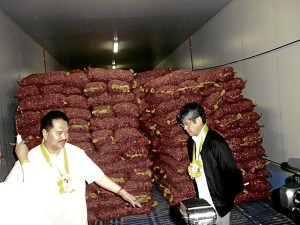In cold storage trade, cool heads prevail
CITY OF SAN FERNANDO—In 1976, at age 14, Alfredo Lagman Jr. made as much as 160 blocks of ice a day in his father’s Alma Ice Plant in this Pampanga capital.
That work, he says, taught him patience and honest labor.
In 1962, Lagman Sr. founded the all-Filipino enterprise Alen that produced Alenaire air conditioners, the first world-class Filipino brand of its kind.
The late Lagman Sr. partnered with Japanese businessmen in the venture Daikin-Alen Air Conditioning Inc., thinking that, through it, the export of local air conditioners would expand throughout Asia. But the venture went bankrupt.
Lagman Jr. later reclaimed Alen from its Japanese partners and rebuilt it.
In 1976, he and his father established Alma Refrigeration and Cold Storage Inc. (Alma).
“That time, it was 80-percent ice and 20-percent cold storage,” Lagman recalls of Alma’s start-up years.
Almost 36 years later, there has been a reversal. Alma now makes 2,000 ice blocks a day and leases out 6,600 square meters for chilled and frozen products to major food producers and processors in the country.
In March, Alma completed a three-year endeavor that enabled the company to run what may be the first environment-friendly cold storage plant in the Philippines.
Lagman, now 49, is satisfied and proud of the latest upgrade because, through it, his company will be doing its bit in preserving the environment.
Alma uses modern energy efficient refrigeration equipment with inverter drives, environment friendly refrigerants and LEDs (light emitting diodes), according to a March 26 certification issued by Starking Inc.
These technologies, Starking says, help reduce carbon emissions and qualify for green compliance requirements.
Starking is a Filipino corporation specializing in industrial refrigeration and heat transfer technology.
This path to turning green came after Alma built what industry leaders call the most modern cold storage rooms in northern and central Luzon.
“We provide the best services to our clientele by using the latest in cold storage technology and giving protection to the environment,” Lagman told the Inquirer during the facility’s inauguration on March 30.
Alma has 15 cold storage rooms where temperature may go down to negative 28 degrees Celsius. At any time, these can accommodate 350 40-foot container vans.
The National Meat Inspection Service gave the cold storage an “AA” rating for compliance with safety and hygienic standards.
The facilities raise the prospects of Pampanga, allowing the province to become the food capital or cold storage capital of the country, says Lagman, Alma president and chief executive officer.
Alma’s employees have grown to 120, all from Pampanga.
Sen. Francis Pangilinan, chair of the House committee on agriculture and who was guest during the facility’s opening, said the country lacks post-harvest facilities like cold storage.
“It’s largely in the hands of the private sector,” Pangilinan said, stressing the importance of cold storage in the food supply chain.
Lagman agrees.
“It’s no joke putting up a cold storage facility,” he says. “It’s capital intensive.”
photos by Tonette Orejas, Inquirer Central Luzon

